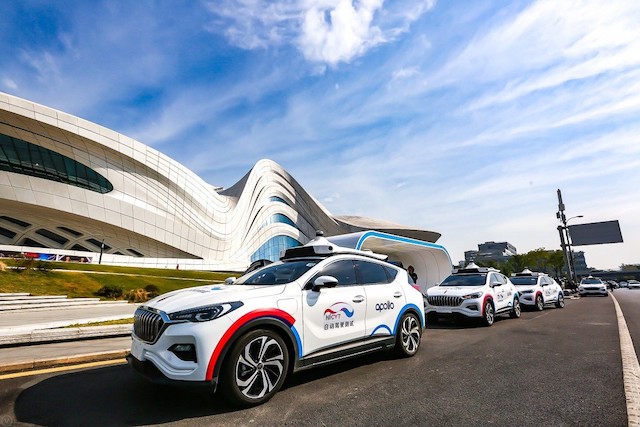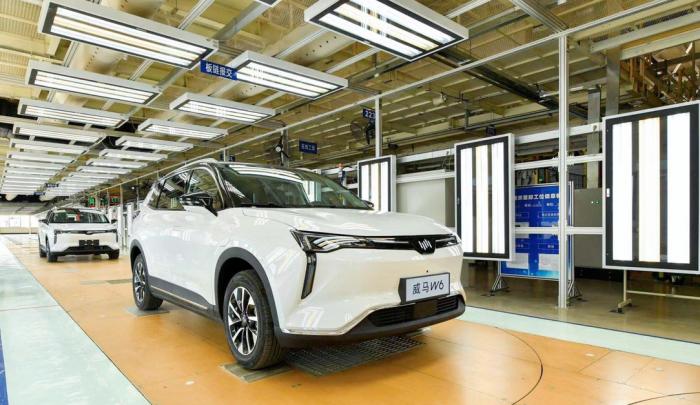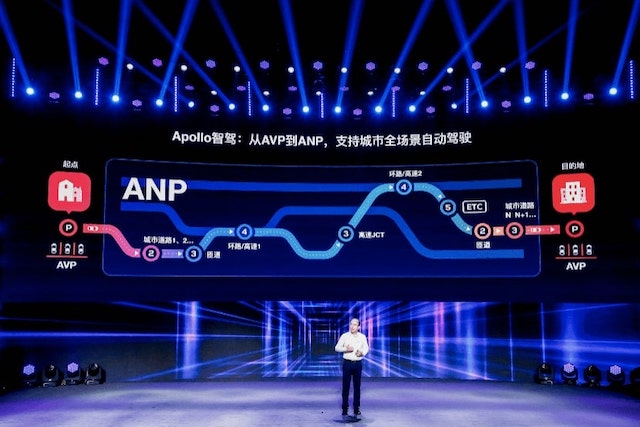Baidu held an event in the last week of October 2021 dedicated to its Apollo autonomous driving technology at Shougang Park in Beijing. The company announced an expansion of the Baidu Apollo robotaxi fleet, a tripling of the available safe road test mileage for autonomous vehicles and a significant update to its 5G Remote Driving solution.
Apollo Moon Arcfox hit the road
First unveiled in June 2021, Apollo Moon is Baidu’s 5th generation of robotaxis for fully autonomous ride-hailing services in the smart transportation industry. Compared to the 4th generation of Apollo robotaxis, the Apollo Moon models cost half in manufacturing with a tenfold performance increase.
With the introduction of three models to its robotaxi fleet: Apollo Moon Arcfox , Apollo Moon WM Motor, and Apollo Moon Aion, Baidu is expected to expand the options for Apollo Go customers in cities across China, aiming to quickly scale up the offering and lead the estimated 1.3 trillion RMB robotaxi market by 2030.
Related report: Outlook of China’s Autonomous Driving Market and MaaS Market
The Apollo Moon robotaxi models utilize the so-called “ANP-Robotaxi” architecture, a leading navigation pilot product that can reduce the weight of autonomous vehicle kits while sharing intelligent driving vehicle data to create a closed-loop information ecosystem.
By combining these capabilities along with a customized LiDAR and corresponding unmanned redundancy functions, fully autonomous driving can be realized.
At the event, Apollo Moon Arcfox hit the road with no safety driver on board, offering a brand new riding experience.
Tripling Test Mileage
Baidu Apollo also announced that it has expanded its safe road test mileage from 6 million kilometers to 18 million kilometers – tripling the amount of road driven by its autonomous fleet.
This marks a significant achievement for Baidu Apollo in its development of autonomous technology, as it applies learnings from the data and kilometers driven to improve the safety and efficiency of its autonomous vehicles.
5G Remote Driving for Enterprise
The network is an integral technology in self-driving vehicles and 5G will play a critical role in making autonomous driving a reality.
At the event, Baidu unveiled its new 5G Remote Driving for Enterprise, which expands the ability of the 5G cloud-based teleoperation technology to support unmanned vehicles in a single scenario to three.
As a remote driving solution, the 5G Remote Driving for Enterprise has four key advantages: high safety, high efficiency, large scale, and support in multiple scenarios.
With a number of patented technologies, 5G Remote Driving can recognize abnormal traffic conditions such as road closures and assist the vehicle in navigating around these conditions safely and efficiently.
Baidu launched autonomous driving MaaS platform with five models
Baidu Apollo topped industry peers across every testing category for the third consecutive year according to Beijing Autonomous Vehicles Road Test Report 2020.
In addition to maintaining the largest fleet of test vehicles and accumulating the highest total testing mileage, Baidu is also the first and only company that has obtained permission to operate fully driverless road tests on public roads in Beijing, according to information sent to CIW from Baidu.
Baidu was the leading company across all four categories:
- number of vehicles for general technology testing
- number of vehicles piloting autonomous vehicle passenger service
- number of vehicles carrying out fully driverless testing, and
- the total mileage of testing
Beijing Autonomous Vehicles Road Test Report is the only authoritative industry assessment of its kind published in China.
As the world’s leading open platform for autonomous driving, Baidu was early in commencing road testing initiatives in Beijing and leads the industry in areas including the total number of testing vehicles, the scale of testing, and diversification of testing scenarios.
Baidu has achieved a cumulative mileage of 2,019,230 kilometers over a three-year period in Beijing, accounting for 91.23% of Beijing’s total testing mileage in three years.
In 2020, Baidu operated a fleet of 55 autonomous vehicles on the roads of Beijing, accounting for 75% of the overall number of vehicles that conducted automated driving tests in the city.
Baidu also accumulated 1,125,305 kilometers of total testing distance, comprising 95.92% of the total autonomous vehicle testing distance in the municipality with a 49.24% increase in comparison to previous efforts in 2019.
To put Baidu’s achievements in perspective, a total number of 87 vehicles from 14 companies had received general road testing permits in Beijing as of December 31, 2020, according to the report.
In late 2020, Baidu was awarded five autonomous vehicle driverless testing permits from the Beijing Municipal Commission of Transport, marking the inaugural batch of permits issued to a company that allows driverless vehicles on public roads.
In preparation for this achievement, Baidu has collaborated with the Beijing Innovation Center for Mobility Intelligent to optimize test parameters and technological specifications by running 64,827 kilometers of driverless vehicle testing in Beijing.
As part of its push to commercialize autonomous driving technologies, Baidu Apollo launched the Apollo Go Robotaxi service in Beijing, as part of the third phase of its autonomous vehicle passenger service pilot.
From October 10 to December 31, a total of 15,006 users hailed an Apollo Go Robotaxi through their mobile devices. The Apollo Go experience was well received, with over 90% of riders stating that they would like to continue using this service in the future.
With a total of 200 autonomous vehicle testing roads across four districts comprising of a distance of 699.58 kilometers, Beijing has become the leading city for promoting domestic autonomous driving initiatives in China, with Baidu spearheading its growth.
Forecast for China’s future connectivity 2021-2024
Multi-Modal Autonomous Driving MaaS Platform
Baidu deployed a multi-modal autonomous driving MaaS (mobility as a service) platform on 9 February 2021 that will provide AI-driven city transportation services in Guangzhou.
Utilizing a fleet of Apollo Robotaxis and Robobuses along with three other model types of autonomous vehicles, this initiative will allow local users to order smart transport services on demand, starting in the Chinese New Year holiday period.
Baidu has partnered with the Guangzhou Huangpu District government to roll out the world’s first multi-modal autonomous driving MaaS platform.
By integrating an assortment of autonomous driving services to provide travel recommendations, this diverse platform can holistically optimize the traveling experience of users in line with combined platform strategies.
Comprising of over 40 autonomous vehicles, the collective fleet has deployed five different model types – Robotaxi, Robobus, Apolong, Apollocop and New Species Vehicle – to begin comprehensively serving the city during the bustling holiday period.
Citizens are able to make reservations on the Baidu Maps and Apollo Go mobile applications to witness these new autonomous driving initiatives and experience the convenience brought on by intelligent transportation technology.
With the ability to cover a variety of usage scenarios, the MaaS platform ecosystem can meet the diverse needs of many citizens during their holiday sightseeing, shopping and celebratory outings.

To facilitate this, Baidu Apollo has established over 50 Robotaxi pickup stations in the district, providing users with easy access to Chinese New Year festival sites using autonomous vehicles.
Simultaneously, a batch of New Species Vehicles are cruising around the city, tasked with unmanned retail, as well as routine cleaning and disinfection.
Apolong minibusses will shuttle eager sightseers to the flower blossoms around scenic parks and lakes. Meanwhile, Apollocop patrols the main roads near key areas and the Baidu Robobus will ferry passengers along fixed routes, facilitating community travels towards festive destinations.
Real-time signal light information such as stoplight countdowns, traffic event alerts, and intersection queue length are broadcasted on both the interactive monitors embedded in Robobus or Robotaxi cabins as well as the exterior screens fixed on the rear of Robobuses.
Additionally, users can utilize the Baidu Maps app or DuerOS-powered smart rearview mirrors to receive voice alerts of electronic fence monitoring, access signal light reminders, live traffic event venue broadcasting and other connected online services.
The ACE Transportation Engine – a full-stack solution that stands for “Autonomous Driving, Connected Road, Efficient Mobility” – has been introduced to improve the traffic flow around the district, reflecting Guangzhou’s status as a center of smart transportation.
A large ACE smart traffic electronic display has been set up on a prominent skyscraper to visually display the AI solutions at work; from the coordination of smart transportation for local commuters by the transportation bureau to the intricate traffic management maintained by law enforcement, the technology is being brought to life and exhibited to the inhabitants of Guangzhou.
The MaaS platform for multi-modal autonomous driving vehicles and ACE Transportation Engine demonstrated by this Chinese New Year launch has accelerated the arrival of the intelligent era of smart transportation.
Guangzhou’s open and inclusive policy environment fosters and encourages the development of the autonomous driving industry. Going forward, Baidu will continue conducting regular trial operations by additionally deploying over 100 Robotaxis and establishing almost 1,000 pickup stations in Guangzhou Huangpu District; this will allow local citizens to continue utilizing autonomous driving services in their daily lives, in lieu of similar Robotaxi programs implemented in Beijing, Changsha, Cangzhou and other areas of China.
In the face of immense opportunities in terms of increasing digitalization, high-speed networking and automation of transportation in the future, this strategic partnership with Baidu has enabled the Guangzhou Huangpu District to become a benchmark city for new smart transportation infrastructure.
Top 10 forecasts of China’s AI market 2021-2024
Baidu co-developed self-driving car to deliver in H1 2021
Weimar Motors announced on 19 January 2021 that Weimar W6, jointly developed with Baidu Apollo, rolled off the production line at Weimar Hubei base today and will be delivered in the first half of this year.

Weimar W6 can realize unmanned driving in specific scenarios through Baidu Apollo. In addition, Weimar Motors founder Shen Hui revealed that Weimar’s next-generation intelligent vehicle platform has been officially launched.
Baidu to produce intelligent electric vehicles with Geely
Baidu announced its plan to establish a company to produce intelligent electric vehicles (EV) on January 10, 2021, and that it has entered into a strategic partnership with multinational auto manufacturer Zhejiang Geely Holding Group (“Geely”).
Baidu released new intelligent vehicle solutions for automakers and several high-end intelligent driving products last December.
Baidu will provide intelligent driving capabilities to power the passenger vehicles for the new venture, and Geely, which holds the distinction of best-selling Chinese automobile brand in past years under the Volvo and Geely brands, will contribute its expertise in automobile design and manufacturing.
At Baidu, we have long believed in the future of intelligent driving and have over the past decade invested heavily in AI to build a portfolio of world-class self-driving services. China has become the world’s largest market for EVs, and we are seeing EV consumers demanding next generation vehicles to be more intelligent.
said Robin Li, Co-founder and CEO of Baidu.
As a top Chinese automaker with global reach, Geely has the unique experience and resources to design, produce and market energy-efficient, reliable and safe automobiles in large scale. We believe that by combining Baidu’s expertise in smart transportation, connected vehicles and autonomous driving with Geely’s expertise as a leading automobile and EV manufacturer, the new partnership will pave the way for future passenger vehicles.
Baidu released intelligent vehicle solutions for automakers in China
Baidu yesterday released new intelligent vehicle solutions for automakers and several high-end intelligent driving products during the second Apollo Ecosystem Conference, reinforcing the company’s commitment to win-win partnerships to propel industry development.
Apollo’s four series of solutions include intelligent driving, intelligent cabin, intelligent map, and intelligent cloud.
Baidu also announced an enhanced Apollo presence in Guangzhou and demonstrated the progress of the Apollo Go Robotaxi service rollout in Beijing, Changsha, and Cangzhou, underscoring both the commercialization prospects and revolutionary potential of intelligent transportation, intelligent vehicles, and autonomous driving.

“The transportation industry and automobile industry are undergoing a once-in-a-century transformation,” said Zhenyu Li, Corporate Vice President of Baidu and General Manager of Intelligent Driving Group (IDG), during the conference.
“With its focus on ‘intelligence’, Apollo is helping automakers to build good cars and governments to build good roads through intelligent transformation.”
“Apollo is committed to openness and hopes to work with partners to create a better future for autonomous driving,” Li added, speaking before a crowd of representatives from 500 ecosystem partners at the conference.
Intelligent Solutions and Products for Automakers
At the conference, Baidu released new or upgraded solutions combining hardware and software to help automakers build more intelligent vehicles.
Apollo’s four series of solutions include intelligent driving, intelligent cabin, intelligent map, and intelligent cloud. Intelligent cabin solutions are already empowering 600 types of vehicles from over 70 automakers, with DuerOS for Apollo pre-installed on over one million vehicles.
Meanwhile, Apollo’s intelligent high-definition map series continued to hold the top market share in 2020 and brought on new automaker partners.
Adding to its existing intelligent driving solutions, Baidu also announced an advanced solution for passenger vehicles called Apollo Navigation Pilot (ANP), which is powered by Apollo’s L4 autonomous driving technology.
Baidu had previously announced cooperation with automakers Guangzhou Automobile Group (GAC), Weltmeister, and Great Wall Motors to mass-produce Apollo Valet Parking (AVP), an L4 autonomous parking solution.
Apollo’s intelligent driving solutions aim to be pre-installed on one million vehicles over the next three-to-five years, bringing a safe and cutting-edge autonomous driving experience to more consumers.
Building an Intelligent Urban Transportation System
During the event, Guangzhou Huangpu district officially launched an intelligent transportation MaaS (mobility as a service) platform, which will include the deployment of robotaxis, robobuses, and autonomous driving utility vehicles that can perform various functions.
The rollout of these autonomous vehicles will cover the core area of Huangpu, where AI roadside sensors and cloud engines are already set up.
Baidu and Guangzhou will also cooperate on a new model for Guangzhou’s digital transportation operator that leverages Baidu’s ACE Transportation Engine – a full-stack solution that stands for “Autonomous Driving, Connected Road, Efficient Mobility” – helping the city establish a leading position in autonomous driving new infrastructure.
Apollo Go to Expand to Thirty Cities
Baidu also highlighted various applications and milestones for its world-leading autonomous driving technologies during the conference, especially Apollo Go, which operates robotaxis and robobuses in multiple cities.
Already operational in Beijing, Changsha, and Cangzhou, Apollo Go has carried over 210,000 passengers and plans to expand to roughly 30 cities over the next three years. Baidu also announced a partnership with ride-hailing app Shouqi to allow users to hail a Robotaxi through the app, opening up a new model of commercialization.
Digitization, connectivity, and automation present revolutionary opportunities for the transportation industry, Zhenyu Li stressed at the conference. Apollo could seize these opportunities to create a new growth engine for Baidu.